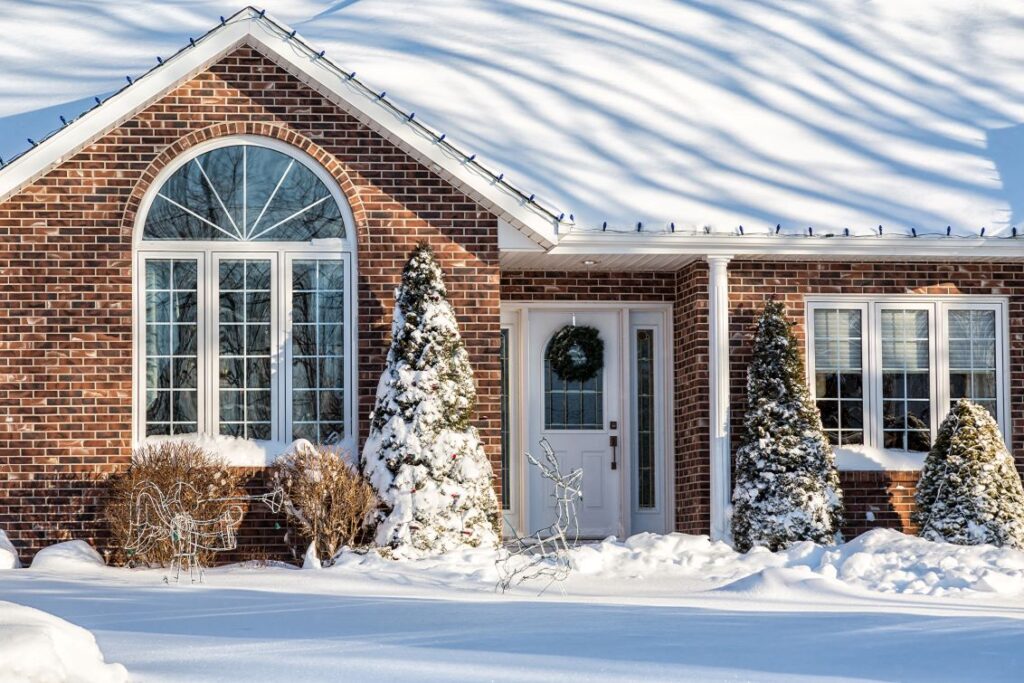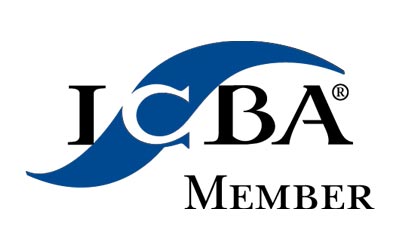You’re already taking steps to protect your biggest investment: your home. You have proper and adequate insurance, you spend money on repairs (or repair things yourself), and you invest in home improvements. But safeguarding your home means different things depending on where you live, especially when it comes to the weather. Living in West Virginia offers numerous benefits, but the winters can take its toll on homes. Prepping your home ahead of the cold season will protect it, and those inside of it, from winter weather and snow damage.
Do You Need to Prep Your Home for the Winter in West Virginia?
In short: yes. During the coldest parts of winter, the temperatures in North Central West Virginia reach well below-freezing with average lows in the 20s °F. While this may not feel terribly cold to many West Virginians, prolonged sub-freezing temperatures can damage your home if not properly prepared for.
This is especially true if you plan to travel during the winter. Whether you are leaving for a one-week vacation to a sunnier climate or if you’re a snowbird who escapes the season entirely, it’s doubly important to winterize your home. After all, you are not around if a pipe bursts, an icy branch falls on your roof, or pests decide to seek shelter. Failing to properly winterize your home will leave you susceptible to property loss, damage, and even theft.

Winterizing Your Home Interior
During the winter, you’ll want to maintain a consistent indoor temperature. This is true whether you are living in the house for the winter or are away. A consistent temperature helps regulate humidity and can prevent issues such as frozen pipes.
When it comes to energy efficiency and staying warm, the most important thing is to keep cold air out. Cold air enters through windows, doors, chimneys, and unseen air gaps. Applying weatherstripping to windows and doors prevents ongoing heat loss. You may even go so far as to apply plastic window treatments if you feel that weatherstripping is insufficient.
For your chimney, make sure it is free of debris and that the fire damper is working properly and not warped. Even if it seems to be working, using a draft stopper can help prevent cold air from entering, energy loss, and keeps pests out of your living room.
Finally, you’ll want to change your HVAC filters and have the system inspected prior to winter. Finding out you have no heat once the cold sets in is not an experience you want to have. And if you’re wintering in Florida, you may return to find that your home has suffered damage from not being properly heated.
Winter Preparation for Basements and Attics
Most of your home’s heat is lost in the lowest and highest parts of your home. Checking for and sealing air gaps is the first step towards winterizing your basement and attic. Locate and seal air leaks around windows and doors. This will prevent heat loss and improve energy efficiency. There are DIY methods to this, but if you are unable to locate the gaps yourself, professional services are available.
You’ll also want to think about the pipes in your basement. Insulating metal pipes will ensure that they won’t freeze and burst. You’ll also want to clear your sump pump discharge lines to prevent flooding. If there are noticeable cracks in foundation, a good time to seal those up is before the cold can make them worse or warm air escapes.
Up in the attic, once you’ve sealed any air leaks, install insulation to prevent ice dam formation and heat loss. A professional can recommend the type and amount of insulation you need for your home.
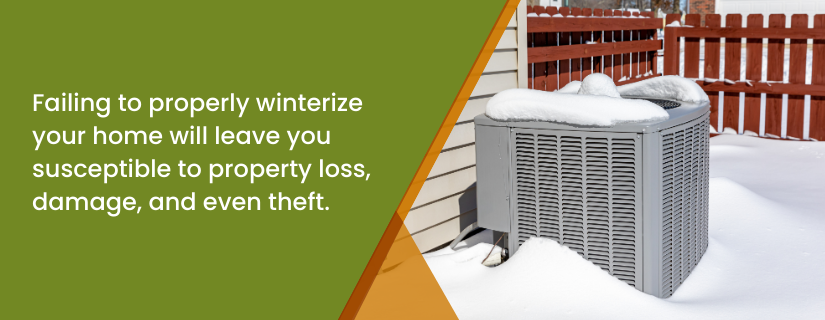
Winterizing Your Home Exterior
Once the inside of your home is taken care of, it’s time to prepare the outside of your home and property for winter.
Starting at the roof, you should remove debris and install snow guards. Snow guards help to prevent snow avalanches and force snow to break off and melt in smaller pieces. While you’re up there, you’ll want to clean out your gutters and install gutter guards to prevent debris from piling up in the gutter and allow the melting snow to drain properly. Together, these two measures ensure that snow will be able to melt from your roof safely, and without causing leaks and water damage.
Preparing your property is just as important as preparing the structure itself. Any cold-susceptible furniture or outdoor appliances like gas grills should be brought inside and stored in your newly winterized basement or attic. Finally, look for dead branches or tree limbs that might be overhanging your house. Ice and snow can cause these to fall on a person or your home. If you can trim these branches on your own, do so, or contact a tree service to do it for you.
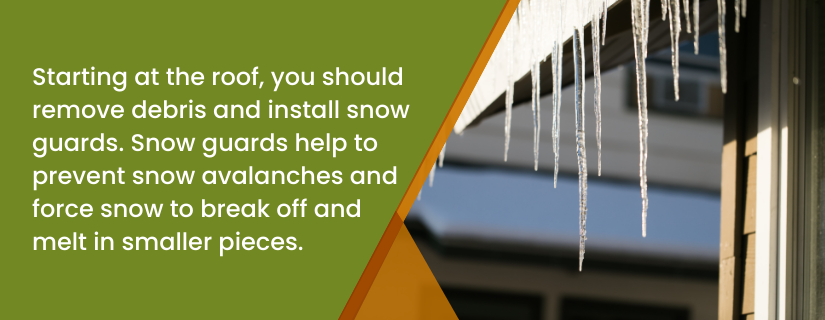
How to Protect Your Home if Traveling for the Winter
There are some additional precautions you’ll want to take if you’re traveling, and they aren’t just weather-related. Did you know that property crimes are more common in the winter? According to LandAirSea, home thefts increase during the cold months, but there are some steps you can take to make your home more secure:
- Invest in motion detectors, home security systems, and upgraded locks
- Have your neighbors look out for suspicious activity, collect your mail, and keep your driveway and sidewalks shoveled
- Avoid posting your vacation on social media
- Leave lights on or use a light timer
These measures will not only deter thieves but give the impression that someone is living in the home.
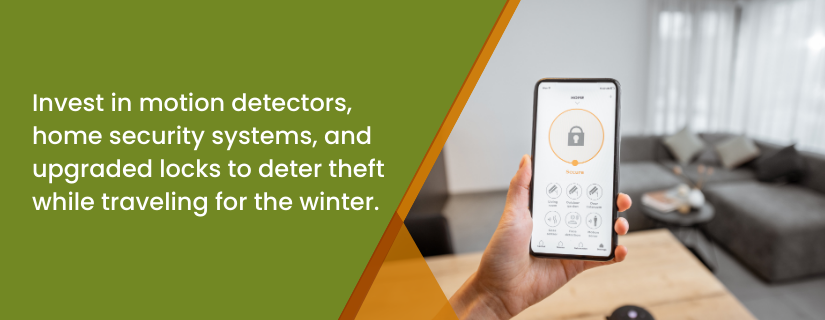
First Exchange Bank is Your Trusted Banking Partner All Year Round
While some of these tips can be done affordably, others are an investment. And while investing in home maintenance and security are worthwhile expenses, they may require some planning. First Exchange Bank offers a variety of personal loans, like a home equity line of credit, that can help you cover these upgrades and winterization costs. Keep in mind that fixing a problem costs more than preventing one. Despite your winterization efforts, you should have an emergency fund set up to cover unexpected costs or repairs that need to be made post-winter. Together with First Exchange Bank, you can have the funds needed to protect your home. With locations across North Central West Virginia in White Hall, Mannington, Fairmont, Fairview, Hundred and Morgantown, First Exchange Bank is nearby to help. Contact us today!


